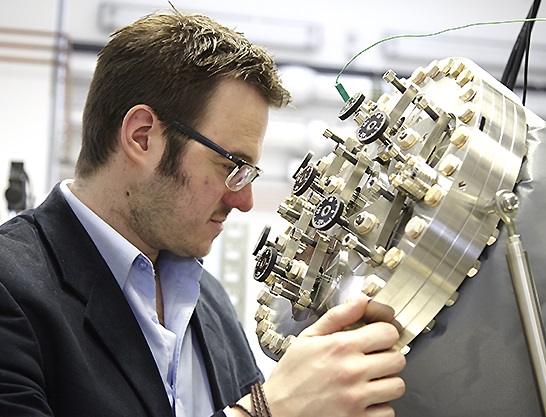About the scheme
The Royal Society has long advocated for the place of practical activity at the heart of science education. Experiencing how science is practiced in real-world contexts is key to fostering engagement, enjoyment, and inspiring a lasting interest in STEM in young people, helping them to develop core skills and competencies for future employment, and life, in general.
The Science Community Grant aims to empower teachers, boost STEM confidence, and embed more practical science learning across participating schools and colleges. Funded organisations will create collaborative communities where teachers can share best practices, receive peer support, and work closely with the organisation and STEM professionals (actively working within academia and industry), to enrich STEM education and hands-on learning. The Royal Society intends to play an active role in this collaborative community of schools and colleges from the outset. It is envisaged that a significant portion of the schools and colleges taking part in the Science Community Grant will build the capacity to apply for a full Partnership Grant.
The aims of the Science Community Grant are to:
- Support UK schools and colleges in undertaking more hands-on, inquiry-based learning and investigative STEM projects
- Allow students the opportunity to experience how science is done in practice
- Provide continuing professional development (CPD) training for teachers to enhance skills and confidence in running practical investigations
- Embed a collaborative community among schools and colleges to help support the delivery of practical science activities and to develop practical investigation and technical skills within students
- Embed a culture of lasting partnership between schools and colleges and STEM professionals
- Embed an outreach culture within universities or industry and develop the engagement skills of early-career STEM researchers
Evaluation and impact reporting is integral to this grant award and grant recipients will be required to collect data to understand the medium-long term impact on beneficiaries, and to provide evidence of sustained partnerships and communities between schools/colleges and STEM professionals, and the integration of practical learning in schools/colleges.
All grant activity, including reporting, should be completed within 39 months of the project start date.
What does the scheme offer?
There are ten Science Community Grants available. The grant amount is a maximum of £105,000 payable over three years.
While the grant cannot be used to support direct staffing costs, it can be used to support coordination and administration of the grant by the organisation.
Funds may also be used for:
- Equipment to enable schools to undertake small-scale investigations
- School and college expenses related to their participation, such as teacher cover and travel costs
- STEM professional costs associated with training and travel costs for school/college visits
- Data collection and evaluation
Full details about the funding and payment schedule, and examples of allowable costs, can be found in the scheme notes.
To help organisations learn more about the grant, online information sessions will be held throughout November, December, and January. Sessions can be booked through the Royal Society’s Event portal.
To find out more about The Julia Rausing Trust, please visit www.juliarausingtrust.org.
This scheme is for you if:
- You are a researcher with a strong track record as an established independent researcher (this can include engineering researchers, humanities and social sciences scholars and scientists)
- You are based at a UK university or not-for-profit research institution for at least the duration of the project
- The research in your application spans the remit of more than one of the Academies. Applications which are within the remit of just one Academy will not be permitted. Please see the breakdown of subject groups and areas supported by the Royal Society.
Applicants will be expected to collaborate with a research partner (co-applicant) from a different discipline from their own or a different university in the UK.
Read the scheme notes for further information on eligibility. Please ensure that you meet all eligibility requirements before applying.
You will apply through our application and grant management system, Flexi-Grant®.
See the ‘Application and assessment process’ page for a general overview of the application and selection steps and see below for details specific to this scheme. Full details of the application and review process are available in the scheme notes.
Assessment of your application will be overseen by the APEX Awards Panel. Following eligibility checks, applications are initially reviewed and assessed by two panel members who have the most appropriate scientific expertise. A longlist is drawn up, with longlisted applications subject to independent review. Following completion of independent peer review, a shortlist is finalised with oversight of the Panel Chair. Shortlisted applications will then have the Public Engagement element assessed (if costs have been requested) before being discussed at a Panel meeting where recommendations for funding are made.
A webinar was held on 30 June 2025 with information regarding the application process, top tips from the selection committee and perspectives from APEX award holders. You can watch a recording of the webinar on YouTube.
The Royal Society welcomes applications from disabled applicants and provides support and adjustments to ensure that they can participate fully in the selection process. If you need an adjustment when accessing the application form, attending interviews, or for any other part of the application process, please contact the Grants team on apex@royalsociety.org or +44 20 7451 2666. All requests for adjustments are made in confidentiality. Any request for an adjustment will not normally be shared with panel members unless it becomes relevant to the assessment process itself. If we need to share your request with anyone (for example if panel members are required to implement any adjustments during interviews), we will ask for your permission first.
Adjustments can include, but are not limited to:
- Extension of the deadline
- Additional support to complete the application form
- Receiving the application form in a different format, such as on a Word document
- Support during interviews as required, including technical support for candidates requiring accessibility software or services
- Additional costs that candidates may incur on account of their particular disability to attend an interview
If you have further questions regarding the scheme, please contact the Grants team on apex@royalsociety.org or visit our contact us page.



